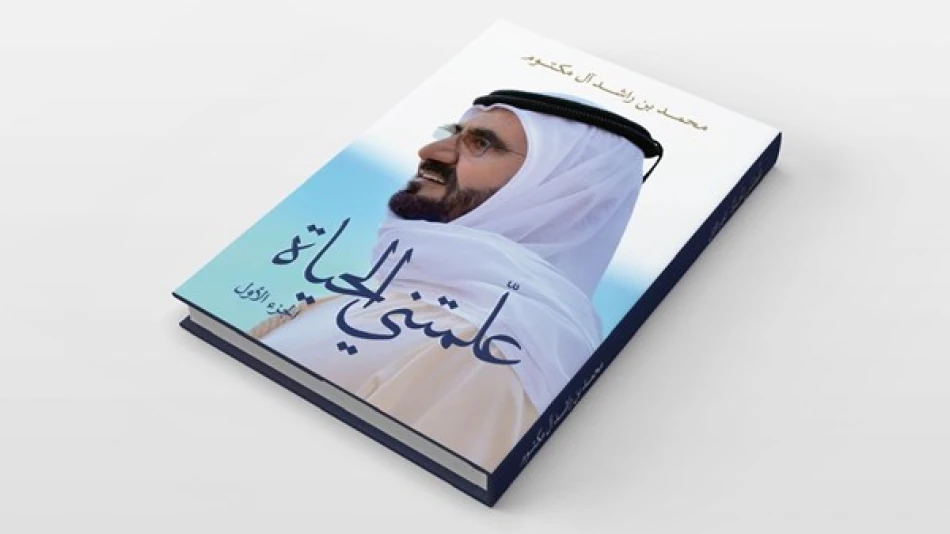
Sheikh Mohammed's Inspiring Memoir 'Life Taught Me' Empowers Generations with Invaluable Insights
Dubai's Ruler Unveils Leadership Philosophy in New Memoir "Life Taught Me"
Sheikh Mohammed bin Rashid Al Maktoum, Vice President and Prime Minister of the UAE and Ruler of Dubai, has released the first volume of his memoir "Life Taught Me," distilling six decades of governance experience into 35 chapters. The book, available in bookstores from September 25, offers rare insights into the leadership philosophy that transformed Dubai from a modest trading port into a global hub, potentially serving as a blueprint for emerging leaders worldwide.
A Legacy Beyond Wealth and Infrastructure
In his introduction, Sheikh Mohammed emphasizes that true legacy transcends material achievements. "The best inheritance we leave is not money, nor urban development and buildings, but real wisdom, beneficial knowledge, and good words that transcend the boundaries of time and nations," he writes.
This perspective reflects a broader trend among Gulf leaders who increasingly focus on knowledge economies and soft power projection. Unlike traditional autocratic memoirs that celebrate concrete achievements, Sheikh Mohammed's approach mirrors Singapore's Lee Kuan Yew's emphasis on institutional wisdom and sustainable governance principles.
The Economics of Freedom: A Proven Formula
One of the book's most significant chapters, "Economic Freedom," articulates the economic philosophy that underpins Dubai's success. Sheikh Mohammed argues that "economic freedom is not a luxury or privilege but a necessity for building competitive societies, and it is greater than a state's natural resources because it is the real fuel that unleashes human potential."
Lessons for Global Markets
This philosophy has practical implications for investors and policymakers worldwide. Dubai's free zones, minimal bureaucracy, and business-friendly regulations have attracted over 200,000 companies, generating approximately 30% of the emirate's GDP. The model contrasts sharply with resource-dependent economies and offers a template for post-oil diversification strategies.
For emerging markets, Sheikh Mohammed's emphasis on government trust in citizens' economic capabilities provides a counternarrative to state-controlled development models. This approach has proven particularly effective in attracting foreign direct investment and fostering entrepreneurship.
Leadership in the Age of Criticism
In a chapter titled "Don't Do Anything, Don't Be Anything," Sheikh Mohammed addresses the inevitable criticism that accompanies bold leadership decisions. "The nature of public work is that it brings criticism... you must endure it, do what's right... let them talk. But if you want complete approval from people, then don't say anything, don't do anything, don't be anything."
This philosophy explains Dubai's willingness to pursue ambitious projects that initially faced skepticism—from the Palm Islands to the Burj Khalifa to becoming a cryptocurrency hub. The approach contrasts with risk-averse governance models and suggests that transformational leadership requires tolerance for temporary unpopularity.
The Silent Killer: Corruption as Systemic Threat
Sheikh Mohammed dedicates significant attention to corruption, calling it the "silent killer" of nations. He traces how corruption evolves from seemingly innocent practices—tips, gifts, favoritism—into systemic failure that ultimately leads to government collapse and social unrest.
Relevance for Developing Nations
This analysis proves particularly relevant for developing countries struggling with institutional weakness. The UAE's ranking as the 24th least corrupt country globally (Transparency International, 2023) demonstrates the practical benefits of zero-tolerance approaches to corruption. For international businesses, this creates predictable operating environments that reduce transaction costs and regulatory risks.
Harmony as Competitive Advantage
The chapter "Harmony" explores why the UAE successfully integrates over 200 nationalities without significant social tension. Sheikh Mohammed quotes Mahatma Gandhi: "A society's peace is a reflection of the peace of its individuals," arguing that the Emirates embody harmony before representing union.
This social model offers lessons for increasingly diverse societies worldwide. As migration patterns intensify globally, Dubai's integration success—where expatriates comprise 85% of the population—provides practical insights for managing multicultural societies while maintaining social cohesion.
Future-Focused Leadership Philosophy
In "Why is the Future More Beautiful?", Sheikh Mohammed articulates an optimistic worldview that has practical governance implications. "Yes, the future is more beautiful because hope is strength, and despair is disbelief... optimism opens the doors of heaven and closes the doors of despair."
This perspective explains Dubai's continued investment in future technologies—from artificial intelligence to space exploration—even during economic uncertainties. The approach contrasts with short-term political cycles common in democratic systems and suggests advantages of long-term strategic thinking.
Implications for Global Leadership
Sheikh Mohammed's memoir arrives as traditional leadership models face increasing scrutiny worldwide. His emphasis on economic freedom, corruption elimination, and social harmony offers an alternative to both Western democratic models and authoritarian systems.
For multinational corporations, the book provides insights into the thinking behind one of the world's most business-friendly jurisdictions. For policymakers, it demonstrates how small states can achieve outsized global influence through strategic positioning and consistent execution.
The memoir's timing—as the UAE positions itself as a bridge between East and West amid global polarization—suggests these leadership principles will face increasing international scrutiny and potential adoption. Whether this model proves sustainable beyond the Gulf context remains the ultimate test of its universal applicability.
Most Viewed News

 Layla Al Mansoori
Layla Al Mansoori






